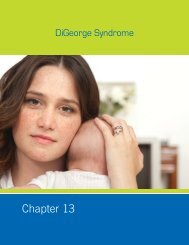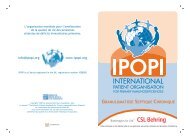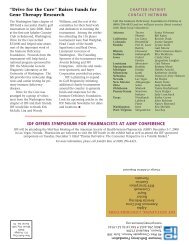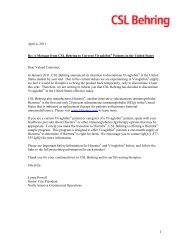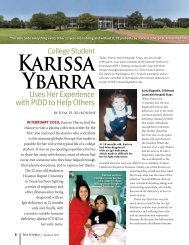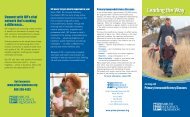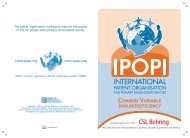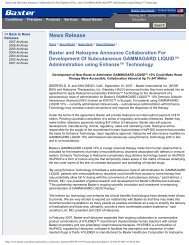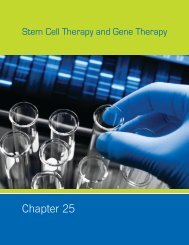IDF Patient & Family Handbook for Primary Immunodeficiency ... - IDFA
IDF Patient & Family Handbook for Primary Immunodeficiency ... - IDFA
IDF Patient & Family Handbook for Primary Immunodeficiency ... - IDFA
You also want an ePaper? Increase the reach of your titles
YUMPU automatically turns print PDFs into web optimized ePapers that Google loves.
General Care 87<br />
Exercise<br />
Participation in age appropriate physical activities<br />
should be encouraged. Hobbies and sports<br />
promote physical fitness and provide an excellent<br />
outlet <strong>for</strong> energy and stress. Swimming, biking,<br />
running and walking promote lung function,<br />
muscle development, strength and endurance.<br />
In general, people who are physically fit and<br />
participate in regular exercise get sick less than<br />
people who do not exercise. In some studies,<br />
people who exercise regularly were even found<br />
to have stronger immune systems. Although<br />
this has not been directly tested in primary<br />
immunodeficiencies, exercise can be a fun,<br />
rewarding and useful part of your routine.<br />
Some patients with a primary immunodeficiency<br />
may have problems controlling bleeding. In these<br />
cases, the types of exercises in which the patients<br />
can safely participate should be discussed with<br />
their physician.<br />
Sleep<br />
Sleep is an essential requirement <strong>for</strong> good<br />
health. An appropriate amount of sleep each<br />
night that is consistent from day-to-day is highly<br />
recommended. Although there have not been<br />
specific studies of sleep habits in patients with<br />
primary immunodeficiency, erratic sleep has been<br />
shown to have negative effects on the immune<br />
system in other types of patients. For this reason,<br />
viewing sleep as a part of your therapeutic<br />
program is very important. Some helpful guidelines<br />
include: 1) trying to go to sleep and wake up<br />
at roughly the same time each day; 2) trying to<br />
avoid late nights; 3) avoiding consumption of<br />
caffeine (such as caffeinated coffee, sodas or<br />
tea) in the evening; 4) trying to minimize potential<br />
disturbances during the night; 5) avoiding long<br />
naps during the day that could interfere with your<br />
regular sleep schedule; and 6) planning your<br />
schedule around a night that will include an<br />
age-appropriate amount of sleep. Children aged<br />
three years and below also require naps during the<br />
day that should be considered an essential part of<br />
their sleep schedule (see table).<br />
Age Appropriate Nightly Sleep<br />
(adapted from Pediatrics. 2003. vol 111, page 302-307)<br />
Age<br />
Average nighttime<br />
sleep duration<br />
(hours)<br />
Average daytime<br />
sleep duration<br />
(hours)<br />
6mos 11 3 1/2<br />
1yr 12 2<br />
2yr 11 1/2 2<br />
3yr 11 2<br />
4yr 11 1<br />
6yr 11 0<br />
8yr 10 1/2 0<br />
10yr 10 0<br />
13yr 9 0<br />
16yr+ 8 0<br />
Stress<br />
The common notion that people get sick more<br />
often when they are under increased stress is<br />
supported by scientific data. Some studies also<br />
show that stress negatively affects the immune<br />
system. There are also scientific studies that show<br />
reducing stress can improve immune function.<br />
Since some of these measures can be low-risk,<br />
they may be worth considering. These include<br />
massage therapy, biofeedback, meditation and<br />
hobbies. These interventions have advantages<br />
that may or may not apply to particular patients.<br />
You should partner with your physician or<br />
healthcare team in considering or choosing<br />
specific interventions (some may actually be<br />
covered by your medical insurance). However,<br />
regular exercise and sleep are perhaps the most<br />
important stress-reducing measures and should<br />
be taken seriously.







